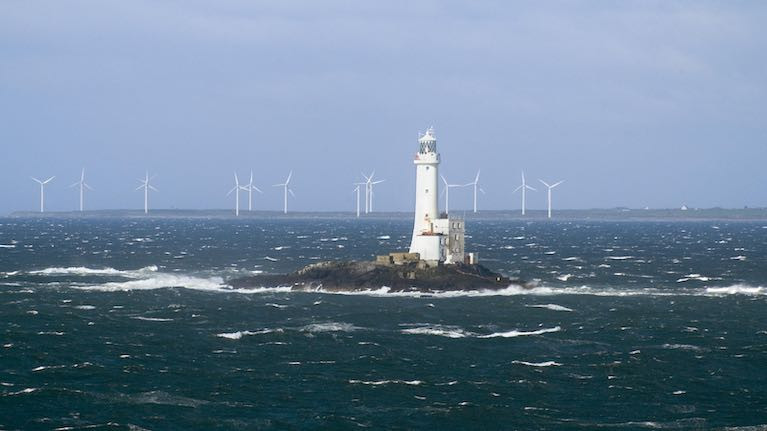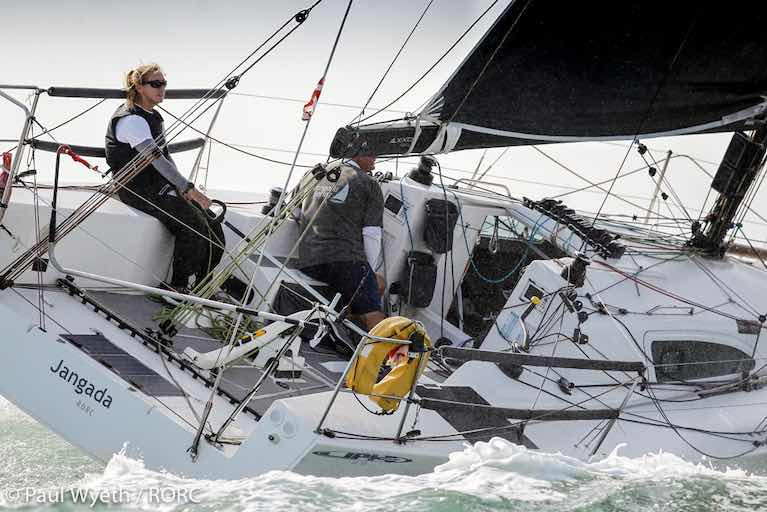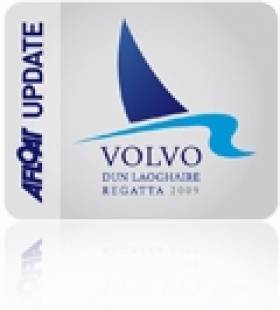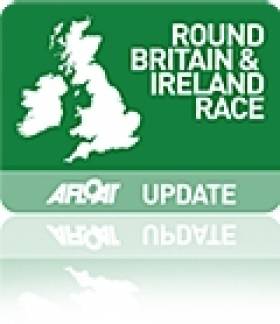Displaying items by tag: two handed
Kish for Breakfast, Tuskar for Lunch – Old Head of Kinsale for Dinner? Ireland's Flying Female Circumnavigators Closing in on the First Major Turn
Female Two-handed Round Ireland Record Day One 1400: Kish Lighthouse for breakfast. Tuskar Rock for lunch. That's the way it is for Pam Lee and Cat Hunt as they've scorched down Ireland's East Coast in a fine fair wind with a sluicing ebb tide in the Beneteau Figaro Magenta Project, intent on establishing a significant female two-handed Round Ireland record
Eight o'clock this morning saw them sweeping away from Dublin Bay in gathering sunshine and brisk northwest to north winds. But at this early stage of the challenge, we haven't seen any incredible speed bursts, as the secret is to avoid damage to the boat in general and sails in particular as they take advantage of a wind and tide system which is panning out very nicely, and will get them on to the south coast and west of the Coningbeg by mid-afternoon.
 A significant female two-handed Round Ireland record in the making - see live tracker below
A significant female two-handed Round Ireland record in the making - see live tracker below
In doing so, they're achieving a steady and more-than-respectable average speed of upwards of 11 knots, and in closing in on the Tuskar with the favourable tide doing some serious work, they're showing better than 13 knots over the ground.
Visibility is currently good at that often misty corner of Ireland, but they'll be so busy they'll scarcely have time to appreciate the views, or the irony of the crowded wind farm of giant turbines on Carnsore Point. It was there that people camped out for months in protest against the possible sitting on the point of a nuclear power plant, so now instead the locals are left with giant turbines whirling in sinister style all about them.
However, Magenta Project's ship's company will be busy at other work, optimising their sail plan for a speedy reach along the south coast, which may well see them thinking in terms of dinner a la main as they zoom on past the Old head of Kinsale.
Sailing Magenta Round Ireland Record Tracker
Jangada Wins RORC Two-Handed Autumn Series
Richard Palmer’s JPK 10.10 Jangada, raced by Jeremy Waitt and Shirley Robertson, won the final race of the Royal Ocean Racing Club’s 2-H Autumn Series to take overall victory in the three-race series. Rob Craigie & Deb Fish’s Sun Fast 3600 Bellino was series and race runner-up. In third place for the series was Daniel Jones’ Sun Fast 3300 Wild Pilgrim. In third place for the final race was Nigel Goodhew’s Sun Fast 3200 Cora, sailed by Tim Goodhew & Kelvin Matthews.
The final race of the Royal Ocean Racing Club’s 2-H Autumn Series was a 103nm overnight race. Starting from the Squadron Line, the fleet headed east out of the Solent on a fast reaching angle to a virtual waypoint off Worthing. A return leg followed with a beat to Winner Buoy and then around the South of the Isle of Wight passed St Catherine’s Point. Close-hauled in big breeze it was a bumpy ride up to The Needles Fairway Buoy. The fleet came off the breeze, to race through Hurst Narrows, and onto the finish off the RORC buoy in the Central Solent.
“With Richard (Palmer) having a knee operation and the COVID situation, this year looked like it was going to be a write-off, “commented Jangada’s Jeremy Waitt. ” However, to win this series was great, and to race with Shirley Robertson was just fantastic. Shirley is very skilled at getting the best speed out of the boat and also has incredible endurance. Last night we were beating into 27 knots, it was on the nose and very lumpy, but she just dug in and we got the win.”
“It has been great fun racing with Jeremy (Waitt) and a big thank you to Richard Palmer for letting us race Jangada,” commented Shirley Robertson. “Jeremy has done so much two-handed racing, he is a really wise head on the boat. I have learnt a lot about the importance of risk management, including concentrating on the important decisions to come. I have to say a massive thanks to RORC. The double-handed class have had the best racing out of anyone; the racing has been really varied. Well done to the RORC for giving us a great summer, the enthusiasm from the club and the sailors has been exceptional.”
RORC Racing Manager, Chris Stone commented: “For the first time in the history of the club the RORC Season’s Points Championship had to be cancelled due to the pandemic. However, the appetite for racing was still there and we have had great feedback from the competitors in both the Summer Series and the 2-H Autumn Series. We have so much to look forward to, especially the highlight of 2021, the Rolex Fastnet Race.”
For full results here
Dun Laoghaire Announces Debut of Two Handed Fleet for Volvo Regatta
Two handed IRC racing makes its debut in July's Volvo Dun Laoghaire Regatta organisers have confirmed this week. Up to six boats have expressed interest in the new intiative and the organisers say the class will race over a mix of coastal and windward leeward courses. It's an exciting development for the regatta that is already receiving a flow of entries 11 weeks ahead of the entry deadline.
Double handed Class captain Olivier Prouveur of the National YC says boats that have expressed an interest so far are the regular ISORA participant Mojito from the UK, Team Windmill (J109), JBellino (J-122), Dinah (Barry Hurley's modified JOD 35 with which he won his class in the OSTAR 2009) and Oystercatcher (second in the two-handed class in the Round Ireland race).
Other boats are also likely now that the regatta has confirmed the class start, according to Prouveur. The hope of course is others, such as round Ireland winners Psipina Paddy Cronin and John Loden or Alchemiste Michael Murphy and Alex Voye might also be interested.
Two-Handed Division for Round Britain and Ireland Race
The Royal Ocean Racing Club (RORC) announced today the introduction of a Two-Handed Division in the non-stop race around Britain and Ireland, sponsored by Sevenstar starting on Monday 23rd August from the Royal Yacht Squadron in Cowes. The news will be of interest to the ten double handed entries for this weekend's Round Ireland Race start from Wicklow.
RORC Racing Manager Ian Loffhagen commented: "We have been receiving a lot of interest and enquiries from competitors who wanted to race double handed in this non-stop challenge, so have made the decision to open it up to enable them to race alongside the fully crewed boats. They will race for the Rebel Maid Trophy."
"Originally we did not have a Two–Handed Division in the race out of deference to the Royal Western Yacht Club's two handed (stopping) Shetland Round Britain and Ireland Race. However when they reached their entry limit the RWYC kindly told us that they were happy for us to open our race to two handed boats."
"The Sevenstar RBI will be the most challenging race of the RORC season for the two handed fleet and we are hoping that it will appeal to the Class 40 fleet in particular. However because of the timing of this announcement the race will not be part of the Season's Points Championship for the Two–Handed Division. It is a stand alone challenge and it will be a big one at that!"
The first boat to enter the Two-Handed Division is Michel Lebrun's IMOCA 60, An Ocean of Smiles.
The Sevenstar Round Britain and Ireland non-stop race covers 1760 miles and is also open to IRC, IMOCA 60s, Class40 and multihulls. It has attracted a highly competitive and international fleet ranging from Volvo Open 70s to Mike Slade's 100ft Leopard 3 and seasoned RORC racers. The yachts will race clockwise around Britain and Ireland, starting from the Royal Yacht Squadron line and a Race Village will be set up in Cowes Yacht Haven. Competitors will be encouraged to join the party at the Race Village following the Rolex Commodores' Cup prizegiving celebrations on Saturday 21st August. The general public will be able to view the yachts taking part in the race and mingle with crews in the Race Village prior to the 1400 start on Monday 23rd August.
The Sevenstar Round Britain and Ireland Race can also be followed via the event website: http://sevenstar.rorc.org and all yachts will be fitted with a tracking device to follow the progress of the fleet. 'Armchair' sailors around the world will also have the chance to test their skills by taking part in a 'Virtual Sevenstar Round Britain and Ireland Race' which will mirror the 1760nm race. The virtual game is free to play and is designed to be as close as possible to the real thing.
Enquiries are open for the race via the Royal Ocean Racing Club: www.rorc.org.































































